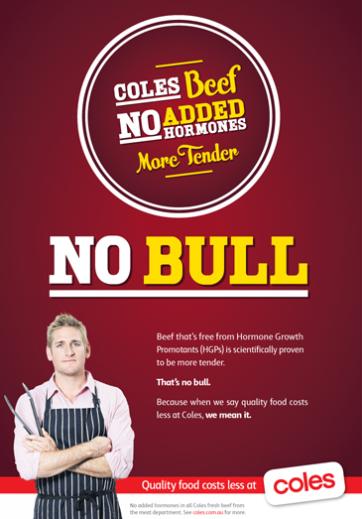Coles Supermarkets is an Australian supermarket chain owned by Wesfarmers. It has 742 stores nationally and more than 93,000 employees. Coles currently has the second-largest market share behind Woolworths Supermarkets.
Coles is now using celebrity chef thingy Curtis Stone to push its ‘No Bull’ campaign, which proclaims all beef sold at Coles is free of hormone growth promotants, or HGPs –  supplements of naturally occurring hormones that reduce farming costs because they cause cattle to produce more beef from less feed.
supplements of naturally occurring hormones that reduce farming costs because they cause cattle to produce more beef from less feed.
Similar marketing claims have made by Whole Foods and Chipotle in the U.S., both which suck at food safety. Tyson tried it with antimicrobials and was told by a judge to stop because of the bull involved.
Meat and Livestock Australia, which acts on behalf of 47,000 meat producers, said Coles’ marketing strategy could frighten consumers into thinking beef from cattle raised on growth-promoting hormones was unsafe, despite years of scientific testing showing it posed no risk.
The group told The Sunday Age it was too early to tell if customers had stopped buying beef from retailers other than Coles, but if the industry was forced to stop using hormones due to unwarranted fear, ramifications could be widespread.
Victorian Farmers Federation president Andrew Broad said, “They’re creating a monster in the mind of consumers that this is bad … when the reality is there are no health risks with HGPs. The campaign implies that there’s some chemical being pumped into the beef, which is just a nonsense.”
Never go with the no-risk message. There are always risks, but these are miniscule compared with the risks of dangerous microorganisms associated with beef. I’m still waiting for someone to step up and market microbial food safety – so there’s fewer sick people out there.
Simon Berger of Woolworths, rightly dismissed the campaign as “a supermarket gimmick that will be bad for the environment and bad for Australian farmers,” and that it would not follow Coles’ hucksterism.
“We have absolute confidence in the Australian beef industry … We have no plans to dictate to them how it’s produced. Removing technology means you need more cattle, eating more (1).jpg) food, on more land, producing more methane over more time to produce the same beef. Someone will pay for that – either farmers or customers, as well as the environment.”
food, on more land, producing more methane over more time to produce the same beef. Someone will pay for that – either farmers or customers, as well as the environment.”
Coles spokesman Jim Cooper defended the campaign, and stressed that Coles wasn’t saying HGP-raised beef was unsafe, it was saying that HGP-free beef was of a higher quality and tasted better, adding, “We are doing what we need to do to improve the quality of beef we sell to customers and that’s all this is about for us.”
But nothing to improve the microbial safety of beef Coles sells to consumers.
CSIRO Professor Alan Bell confirmed there was no proof that HGPs in beef posed a health threat to consumers. But a recent CSIRO study, published in the journal Animal Production Science, supports Coles’ assertion that HGP-free beef is more tender. The study found the hormones had a ”negative influence” on tenderness, taste and quality.
HGPs have been used in Australia since 1979, and about 40 per cent of cattle are now implanted with slow-release HGPs, which add an estimated $210 million in production gains to the Australian beef industry each year.
The group said the amount of hormones found in HGP-raised beef was far lower than the level of hormones naturally occurring in many foods. One egg contained about the same amount of estrogen as 77 kilograms of beef.
